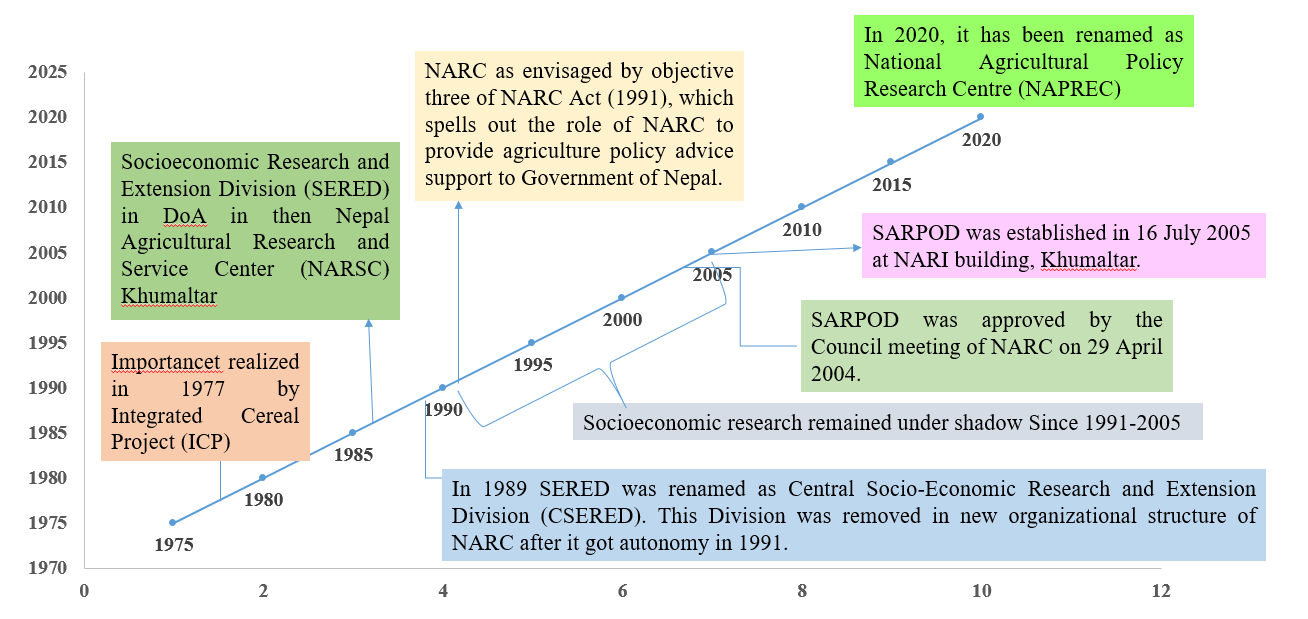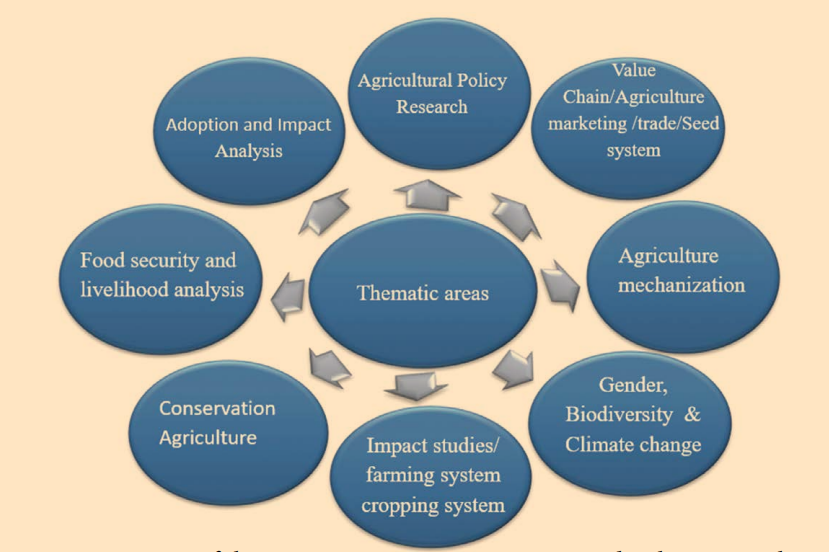Introduction
Socioeconomic and policy research is becoming an integral part of agricultural research projects and programs in Nepal. The concepts, framework and methodological tools for socioeconomic and policy research are derived from social science disciplines. Social science disciplines help in bringing human dimension and issues in the research process and cover a wide range of research issues ranging from identification of research problems to research for solutions to complex interdisciplinary problems and ex-post evaluation of research benefits. Social science can contribute critically in the analysis and conduct research in crosscutting themes such as poverty, food security, gender and natural resource management. Social science disciplines that are important in agricultural research are economics, sociology, anthropology, social geography and political sciences. The principle clients who directly use socioeconomic information are (i) biological and physical scientists (ii) research managers (iii) extension personnel (iv) public and private sector institutions (v) farmers, CBOs and I/NGOs (vi) policy makers.
Importance of socioeconomic research in agriculture in Nepal was first realized in 1977 with the initiation of Cropping System Project of the Integrated Cereal Project (ICP) at the Agronomy Division, Khumaltar. Recognizing the importance of the social science component in the agricultural research during the ICP period, Department of Agriculture (DoA) in 1986 established Socioeconomic Research and Extension Division (SERED) in then Nepal Agricultural Research and Service Center (NARSC) Khumaltar with the assistance of Agricultural Research and Production Project (ARPP) of the USAID. In 1989, SERED was renamed as Central Socio-Economic Research and Extension Division (CSERED). However, this Division was removed in new organizational structure of NARC after it got autonomy in 1991. Since 1991 to 2005 (for a decade and half), the socioeconomic research remained under shadow and some of the essential socioeconomic research activities (diagnostic and baseline studies and few technology assessment studies) were carried out within the umbrella of Coordination of Special Project Division from (1991-1994) and then in Outreach Research Division (1994-2005).
During the implementation of Agriculture Research and Extension Project (AREP) of the World Bank from 1998-2002 and formulation of NARC Vision 2020, NARC research management felt the importance need to establish Socioeconomic and Policy Research Division to streamline and fulfill the policy mandate of NARC as envisaged by objective three of NARC Act (1991), which spells out the role of NARC to provide agriculture policy advice support to Government of Nepal. Hence considering the important role of socioeconomic and policy research in agriculture in NARC, the institutional structure of Socioeconomic and Agricultural Research Policy Division (SARPOD) was approved by the Council meeting of NARC on 29 April 2004. Institutionally, the Division was formally established in 16 July 2005 at NARI building, Khumaltar. In 2020, it has been renamed as National Agriculture Policy Research Centre (NAPREC). This centre is housed in Khumaltar. The office is situated in first floor along with National Potato Research Program (NPRP).

Fig 1: History of Establishment of NAPREC
Goal
Improved agricultural research and development of the country through generation and promotion of socioeconomic information, knowledge base and research policy
Objectives
- To conduct study and research on existing national agricultural policies aiming to assist the Nepal government through council in formulating the new policies.
- Assessment of the different agricultural technologies from socioeconomic, marketing and gender perspective that have been developed by Nepal Agricultural Research Council.
- To enhance the capacity of agricultural socio-economists for quality research.
- To coordinate and cooperate with national and international agricultural organizations taking permission from the council.
Strategies
- Implement research programs in coordination with Social scientists in different DoAR, Commodity Programmes and Centres of NARC to cover key sectors and themes
- Collaborate with relevant national institutions in Nepal in socioeconomic and policy research to assess and address priority needs of the clients and to contribute to formulation of agricultural research policy
- Develop linkages with International Agricultural Research Institutes and Universities to carry out research that have national and international relevance through generation of resources, information access, new technology and capacity building
The major vision, goals, objectives and strategies of the Centre is to contribute NARC’s mandate which aims to enhance the contribution of agriculture to livelihoods, especially those of the rural poor through development and promotion of demand-driven technologies, research policy and technical services.
Current thrust areas for research
Current thrust areas for research include: technology tracking and adoption, research impact and evaluation of technologies and research programs, seed system and seed policy, marketing and value chain analysis of high value crops and commodities, gender and social inclusion studies, analysis of agricultural research policies and strategies, poverty and livelihood assessments, socioeconomic studies on conservation of agricultural biodiversity and climate change effects on farmers livelihoods (Figure 2).

Fig 2: Focus of thematic areas in socioeconomic and policy research
Human resources
- Mr. Samaya Gairhe, Scientist-2 (Agricultural Economics)/Acting Chief
- Mr. Surya Prasad Adhikari, Scientist, S-2 (Agricultural Economics)
- Mr. Sanjeeb Subedi, Scientist, S-2 (Agricultural Economics)
- Mr. Yogendra Acharya, Scientist, S-2 (Agricultural Economics)
- Ms. Meena Kharel, Scientist, S-2 (Agricultural Economics)
Contact Address
National Agricultural Policy Research Policy Centre
Khumaltar, Lalitpur, Nepal
PO Box 5459, Kathmandu
Tel: 977-1-5540818
Email: aprod.narc@gmail.com
Website: www.narc.org.np
